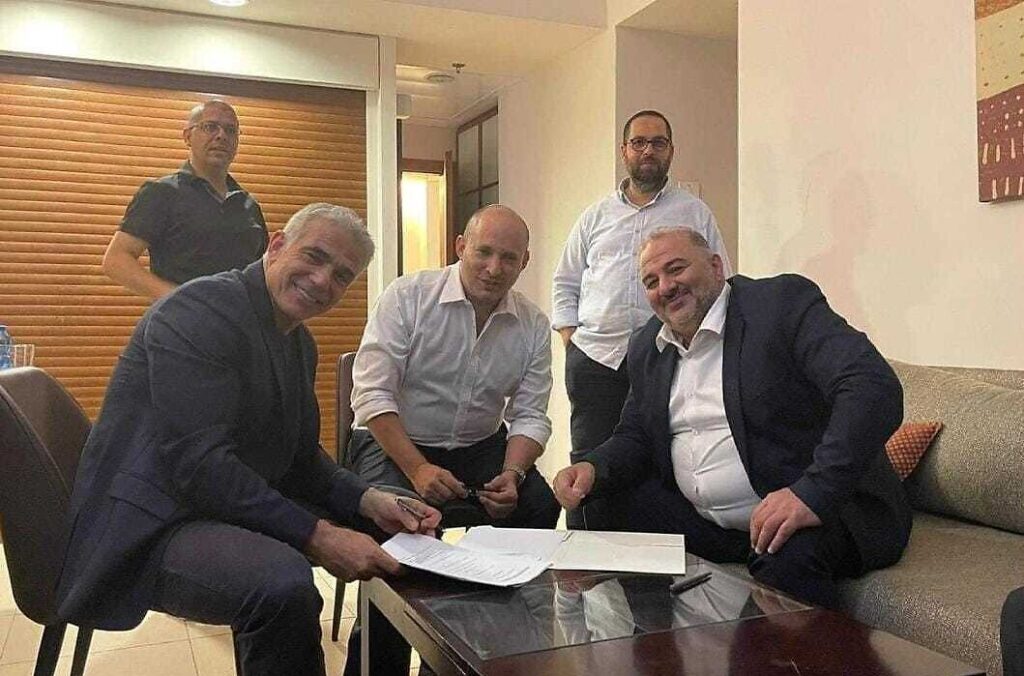Among all the Middle East photos we will remember from 2021, we chose the one showing Mansour Abbas, leader of the Islamic party Raam, signing with Naphtali Bennett and Yair Lapid the coalition agreement sealing for the first time the entry of an Arab party into a government in Israel. Even though it is still too early to take stock of its action, we have organized on November 8th a videoconference in order to make an initial assessment of its functioning after four months. (You may see again that conference on our website.) Anyway, whatever the future of this government will be, that photo is sure to mark a turning point in the history of Israel, as a testimony to the integration of Israeli Arabs in the democratic life of the country, which strengthens that of Israel in the region.
As for the issue of Israeli-Palestinian relations, 2021 ends with Mahmoud Abbas’meeting with the Israeli Minister of Defense Benny Gantz, who took the initiative to invite the Palestinian President, a mark of respect to which his host has been very sensitive. That meeting, following the one in Ramallah betweeen the two men, could not happen without the approval of the Prime Minister, Naphtali Bennett. Even though no photo was released from this meeting, this visit, the first one since 2010 of the head of the Palestinian Authority to Israel, it remains nonetheless a major event in the history of Israeli-Palestinian relations. It reflects the willingness on both sides to re-contact at this level. However, the goals were not the same for both parties.
For Gantz, whose leeway is restricted due to the composition of the government, the main point was to provide a limited amount of administrative relief and to help them economically in order to prevent the Palestinian Authority from collapsing, to strengthen the security cooperation for the benefit of both parties and…, incidentally, to present himself as the leader of the left wing of the government.
On the other hand, Mahmoud Abbas’ goal was much more political. He came with a delegation of Palestinian senior officials in charge of security and economy, and he informed his interlocutor, according to the Fatah’s spokesman, that : “we are witnessing the last opportunity before an explosion occurs, and that , without a political formula, the situation might easily explode.” The Palestinian President reaffirmed to Gantz his commitment to maintain the security cooperation with Israelis and his refusal of violence. As evidence, the Palestinian security forces, mobilized these last weeks to stop the security degradation, have arrested in the West Bank fifty Hamas members responsible for organizing dozens of attempted attacks against Israelis, and preparing a new intifada. On the internal political scene, the old Palestinian leader, strongly rivaled by the Hamas in the West Bank, needs, on the eve of the next PLO meeting, taking place in January, and of the 8th Fatah Congress, in March, to strengthen his image more and more denounced by the Palestinian population that blames him for having obtained nothing during years of negotiations with Israelis. Criticized for visiting Gantz, Abbas must show that the significant gains achieved during that meeting : 100 million shekels on the collection of VAT gathered by Israel on behalf of the Palestinian Authority, regularization of the situation of six thousand Palestinians living without status in an area of the West Bank controlled by Israelis, six hundred travel permits allowing Palestinian businessmen and VIPs to get around in Israel…are part of a resumption of dialogue with Israelis. Palestinian officials, knowing that they won’t be able to resume serious negotiations with that government, are actively seeking the Israeli leader who will be Rabin’s successor. Could it be Gantz, as Mahmoud Abbas told him ? Meanwhile, as Yair Lapid, the Israeli Minister of Foreign Affairs, said during a recent interview published by Le Monde, “The structure of the Israeli government does not allow it, like that of Palestinians, to move towards negotiations. We want to help them improving their lives and their economy.”
Meanwhile, on the ground, unfortunately, prevails the violence of the most extreme settlers. According to the Israeli authorities, while 507 offences have been registered in 2020—almost twice as much as the ones registered in 2019 (363)—during the first six months of 2021, 416 incidents seem to have been perpetrated against Palestinians : physical assaults, destruction of property, grubbing up olive trees… We will devote our next videoconference to this subject, on January 17th.
2021 thus ended in half-tone, with some progress and a lot of hope, following the change of government in Israel and the return to power, after more than twenty years, of party representatives committed to ending the occupation, but also many fears of seeing, in case there is no serious resumption of negotiations, a new outbreak of violence.
In this time of wishes for the new year, we hope reason and hope will come back in the Middle East. And we wish you and your loved ones all the best for 2022






